Ricochet is the best place on the internet to discuss the issues of the day, either through commenting on posts or writing your own for our active and dynamic community in a fully moderated environment. In addition, the Ricochet Audio Network offers over 50 original podcasts with new episodes released every day.
 Is Food Waste Really Your Problem?
Is Food Waste Really Your Problem?
If you’re of a certain age, especially growing up in Heartland, USA, you heard these words from a parent at the dinner table while growing up: “Clean your plate. There are starving kids in China.”
That wasn’t wrong. Millions died from starvation during Chairman Mao’s Communist cultural revolution in China during the 1960s and early ’70s. It’s a sordid tale. The “Great Leap Forward,” Mao called it. To the grave, perhaps.

But my mom was more focused on eliminating food waste in our home. After all, we were often on a tight budget in rural Oklahoma, and food was money. We didn’t have a lot to waste. And my mom and dad could get very creative with the food we had. Ever enjoyed chicken-fried steak? As products of the Great Depression and Dust Bowl, they understood it better than I did.

Food waste is still money. Just ask any food manufacturer. They have been working overtime for years to eliminate waste from their production. I would know, having spent more than two decades in the food industry and toured dozens of plants, from bakeries to fruit and vegetable processors.
My first memory of the food industry was touring a long-gone Wilson meat slaughterhouse and processing plant in Oklahoma City as a young high school junior. The visuals remain fresh in my mind 50 years later. Not everyone finished the tour. Very little from any cow or pig went to waste. The last thing made on the production line, I remember, was lard. I learned a lot on that visit, not knowing that I would eventually go on to a 22-year career in the food industry.
Food waste is throwing money away, and food makers don’t enjoy large profit margins for their products. Neither do grocery stores. If you can legally and safely “rework” discarded products, you find a way.
But when it comes to food waste, food makers are not the problem. Neither are grocery stores, farms, or even most restaurants. Other food service operations and home consumption seem to be where most of the waste occurs.
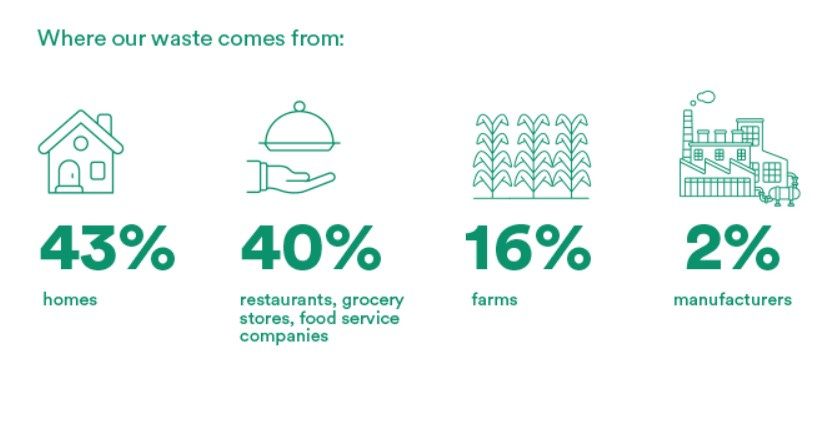
How much? Estimates vary, but somewhere between 80 billion and 100 billion pounds annually. Waste hauler RTS translates it for you here.
Just how much food do Americans waste? Here’s some “food” for thought: While the world wastes about 1.4 billion tons of food every year, the United States discards more food than any other country in the world: nearly 40 million tons — 80 billion pounds — every year. That’s estimated to be 30-40 percent of the entire US food supply, and equates to 219 pounds of waste per person. That’s like every person in America throwing more than 650 average-sized apples right into the garbage — or rather right into landfills, as most discarded food ends up there. In fact, food is the single largest component taking up space inside US landfills, making up 22 percent of municipal solid waste (MSW).
We indeed waste a lot of food. But we still have lots of it. We use as much as we can, but much still is tossed. And as for “food insecure” people, what does my food waste have to do with them?
There are a couple of easy answers, but not many. Organizations like Feeding America work on “food rescue” to help feed “food insecure” families through food banks and other distribution programs. That’s great. And there are plenty of families in need out there. After all, about one in seven (over 40 million Americans) are on food stamps (Supplemental Nutritional Assistance Program, now called SNAP). Most of us want to help people in need.
But it’s a matter of simple economics. If we waste less, we spend less (except for Biden-caused inflation with an assist from often-government-inspired supply chain issues). We increase the food supply, which can help keep prices in check. How well stocked are your grocers these days? Last Thursday, my local Harris Teeter was pretty bare of chicken and lots of other products.
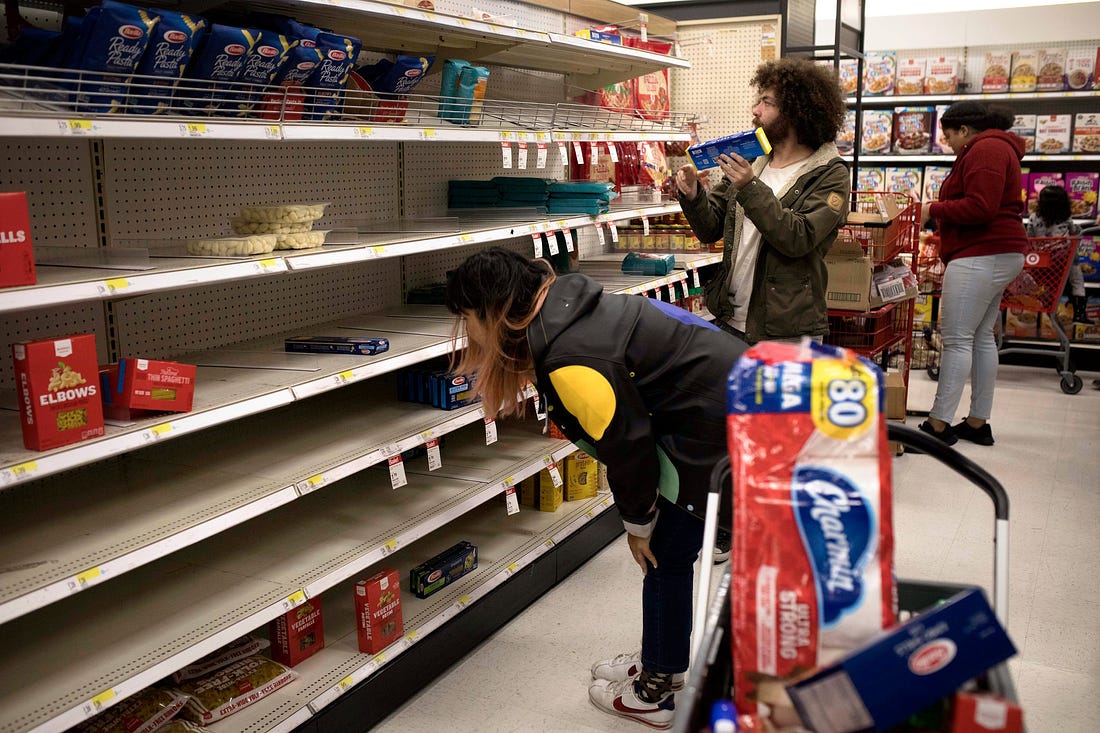
And there is one straightforward way we can manage food waste, by doing a better job with food labels.
A story. When I resided in Philly, a favorite radio show was Rich Zeoli’s on 50,000-watt 1210 AM WPHT. He features a terrific cohost and former television news anchor, Dawn Stensland Mendt. I remember hearing her say that she throws away food if it comes within a week of the expiration date.
You’re throwing away a lot of perfectly good food and lots of money, I thought. I did a segment or two on Rich’s show regarding food labels, working to dissuade Dawn and her disciples from the misconception. I have no idea if I was successful, but it underscores that food date labeling continues to be a problem. And it is not necessarily her fault.
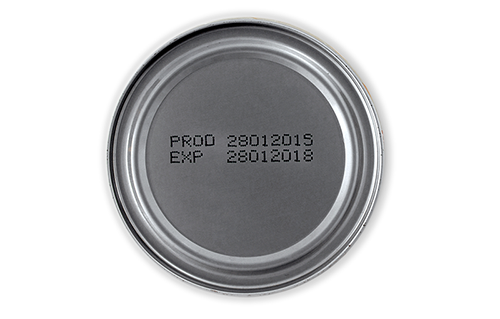
I’m persuaded one of the significant reasons we toss perfectly good foods from our pantry and refrigerators is our poor understanding – and many food companies’ pathetic job – of “food date labeling.” Allow me to share a few good and not-so-good examples.
First, the food industry has worked tirelessly to help consumers—governments, less so. Food product manufacturers and retailers developed a voluntary system quickly embraced by 80 percent of the packaged food industry. It separates food date labeling between “safety” and “quality” concerns.
Second, one of America’s more significant food wasters is the federal government. For example, if you’re running a production line of pasta sauce with meat, a USDA regulated facility, and the inspector doesn’t show up to “inspect” the production, you may be required to toss hundreds of cases of perfectly good product into a landfill. Same with foods that are safe but have the wrong label affixed. USDA features a largely out-of-date “continuous inspection” regime, even for processed foods that are heat-treated to kill any pathogens.
Most food recalls are based on mislabeling (failure to disclose allergens, for example) than over safety issues because production lines put the wrong label on certain products.
During the pandemic, government-forced lockdowns resulted in millions of food being destroyed. We have a potato shortage today because of it.
And don’t get me started on how much waste occurred from some of Michelle Obama’s ill-advised food nutrition mandates that, fortunately, have been eased over the past few years.
And because dairy waste is universal, this British food retailer is scraping use-by dates on milk entirely.
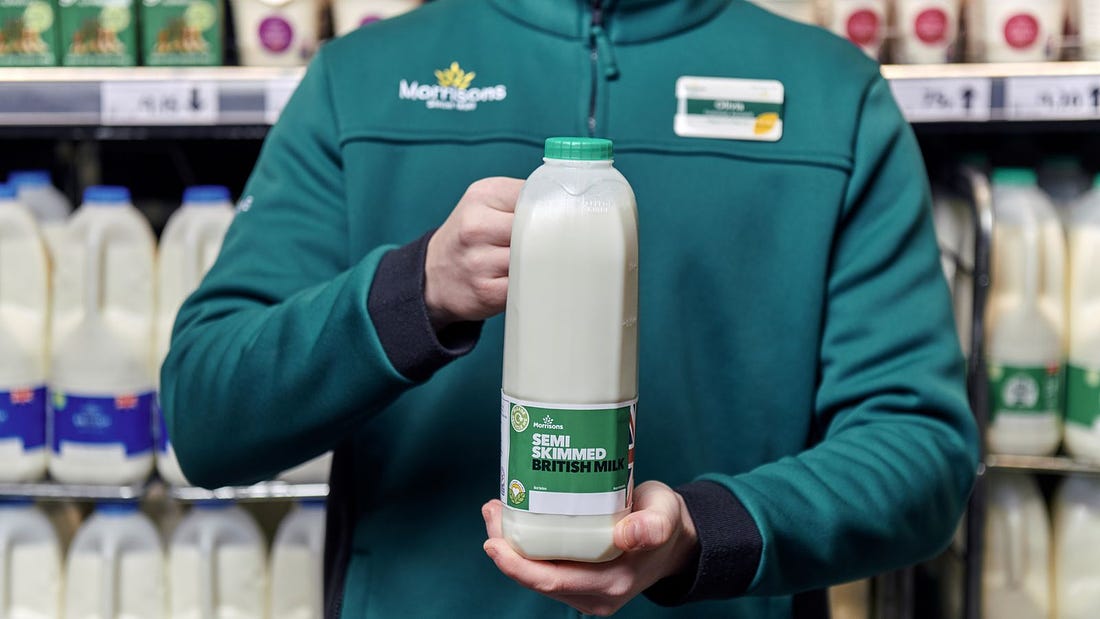
Understanding food date labeling
If your product doesn’t have a long shelf life and might post a safety issue, it has a “use by” or “expires” date. If it is more of a quality issue – the product is safe to use past a specific date but might experience some reduction in “quality” – then you will see the words “best by” or “best if used by” on the package. The fresh egg industry provides a great example.
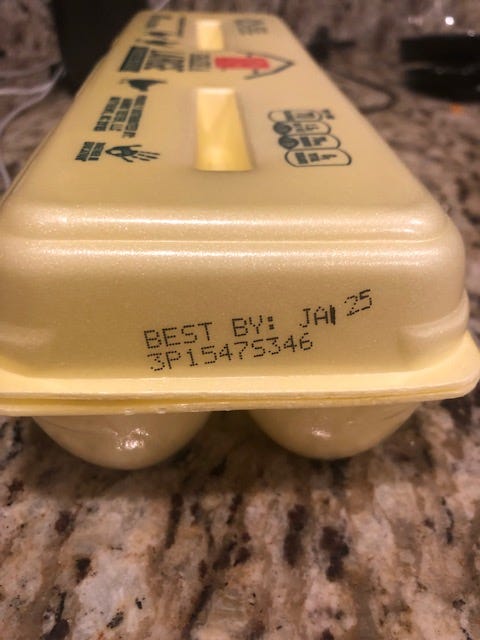
My eggs here are perfectly good through and beyond January 25, probably a week or two. No need to toss them out after the date. The production codes you often see next to dates help with tracing and recalls if needed. Most products are suitable for at least a week after those best-by dates.
Sadly, not all such labels are so instructive, or easy to read. Take this private label salad dressing from retailer Harris Teeter, which clearly is consumer-unfriendly.
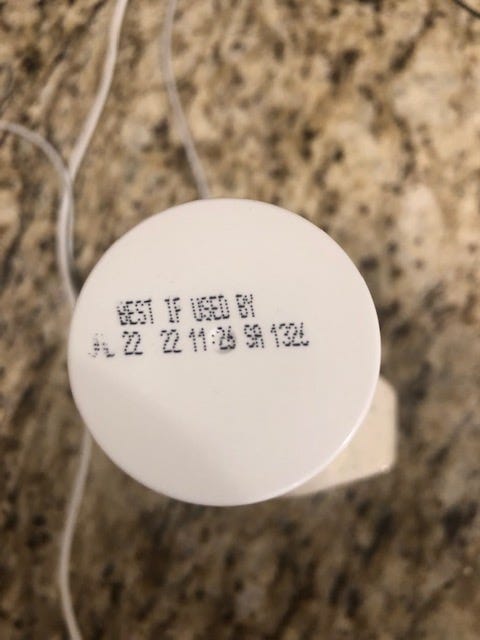
I get that it has a quality date of maybe July 2022, but how many consumers will get that? At least it’s on the top of the lid, easy to see.
And there are certain imported foods, like a personal favorite, Prosciutto from Italy. No quality or expiration date, but a “purchase by” date. That’s helpful, but how long is it suitable after I purchase it? This company needs to do better. But perhaps most Prosciutto eaters like me consume this well before the sell-by date. Let’s hope so.
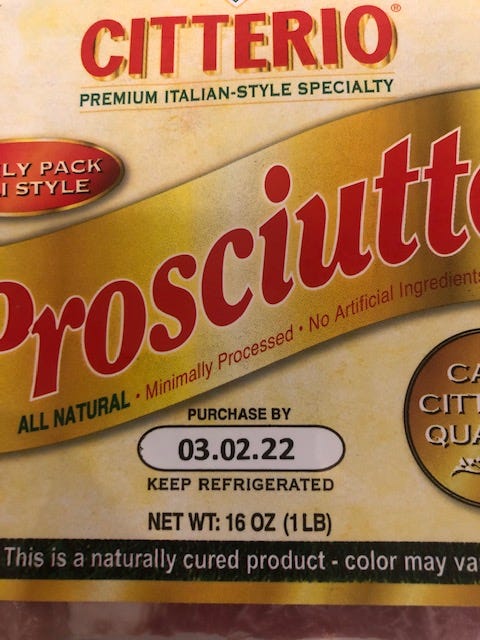
Some other examples. Here’s some Pace salsa. Please use either “best if used by” or “use by” before the date listed here. Really, Campbell Soup (owner of Pace)? I thought you agreed to the industry standard for date labeling a couple of years ago?
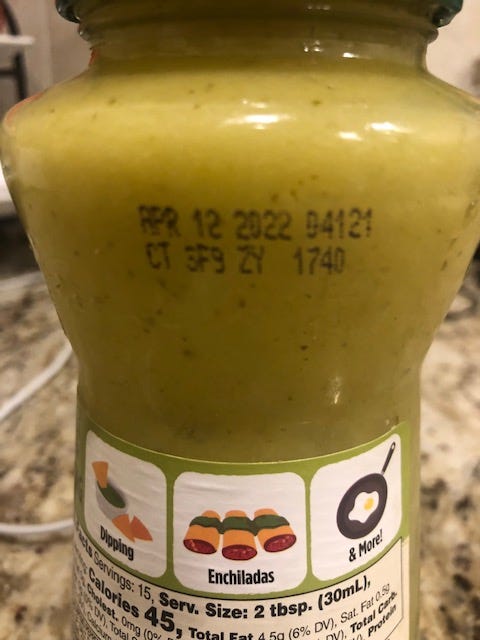
And here’s some private label shredded cheese from my local grocery store. Good job!
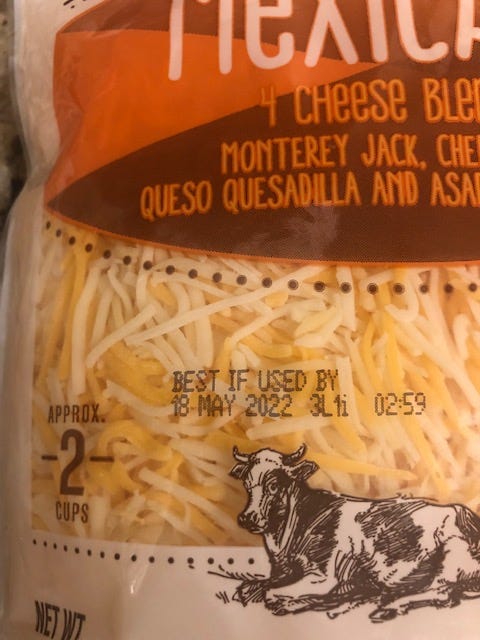
And my grocery store fresh salsa does a better job labeling than Pace.
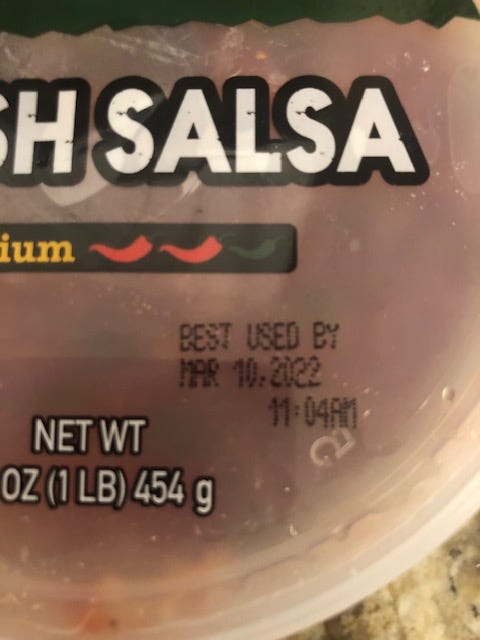
I hope this is helpful. I’m just trying to help you reduce your food waste. Some waste is inevitable, as circumstances and excess purchases sometimes get in the way. And don’t let anyone shame you, or so-called consumer advocates blame food companies for making “too much food.” It’s what helps keep prices affordable and food plenty for all of us. I still have some food rationing coupons used by my grandparents during World War II. No, thank you.
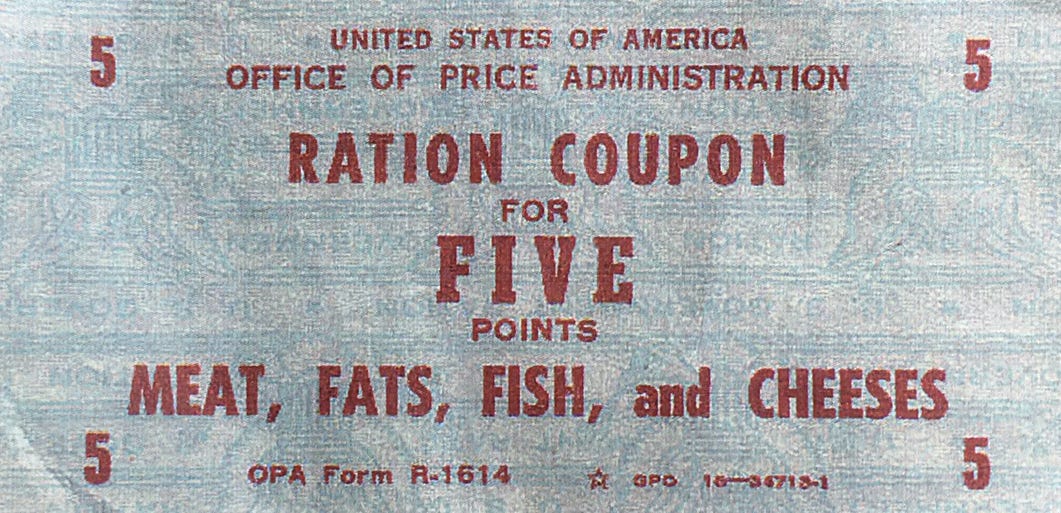
The good news is that if you find yourself with slightly expired shelf-stable foods, your local food bank is happy to take them. Or, you can still use them.
We all can do our share and help cut our own food costs if we pay attention to and learn to use food date labels.
It can be your own “Great Leap Forward.”
Published in General



Mary, Mary, quite contrary
How does your ocean grow?
I have experienced zero ill effects from watching “How It’s Made” videos on sausage.
Our backyard septic system is located far enough from our garden that it won’t help provide fertilizer for growing food while I’m still alive.
That sounds vaguely familiar, now that you type it.
That would help explain the methane, too. There is a landfill in our county that I ride past occasionally. Sometimes the gas smell downwind is pretty bad. It’s probably not the methane itself, but other gasses that are also the product of anaerobic digestion.
To my understanding there’s aerobic bacteria and anaerobic bacteria. Aerobic bacteria does it’s thing in oxygen rich environments, and anaerobic is suited to oxygen poor. If you put (green) food waste in a compost heap it will quickly breakdown into loam because a compost heap is a highly oxygenated environment, but it it goes in a landfill, it will tend to ferment and putrefy because of the lack of oxygen.
My mom introduced me to the difference between best by (aka guaranteed quality) and expired (aka dangerous to use) early. We tend to keep our pantry and fridge lean, so most stuff doesn’t get a chance to expire. I did throw away a few packages of tofu the other day on the theory that if we’ve had it since the Bush administration, we aren’t going eat it even if it was still good to eat.
Throwing away tofu is its own reward.